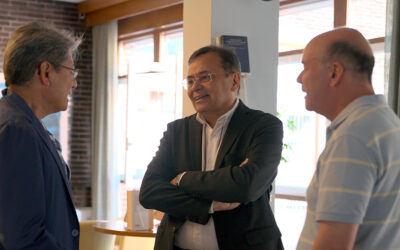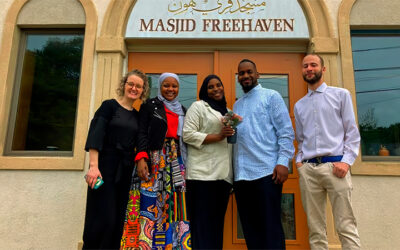Jesus addressed these words to Peter who, after listening to the marvelous things he was saying, put this question to him: “Lord, how often must I forgive my brother if he wrongs me? As often as seven times?” Jesus replied:
«Not seven times, I tell you, but seventy times seven times.»
Most likely, Peter had been deeply struck by the Lord’s preaching, and being a good and generous person, he had decided to throw himself into the new course of action which Jesus was advocating. He was ready to do something he thought exceptional for him, to forgive even seven times. In fact, Judaism accepted the idea of forgiving two, three, at the most four times.
But by responding, “seventy times seven times,” Jesus is saying that the kind of forgiveness he wants has no limits. We must forgive always.
«Not seven times, I tell you, but seventy times seven times.»
This phrase calls to mind the biblical song of Lamech, a descendent of Adam: “Sevenfold vengeance is taken for Cain, but seventy-seven fold for Lamech” (Gen. 4:24). Thus hatred began to spread among the people of the world, swelling like a river at flood time into an ever-growing sea of hate.
Against this spreading of evil, Jesus proposes an unlimited and unconditional forgiveness that is capable of breaking the cycle of violence.
Only forgiveness can stem this tide of ill will and offer the human race a future that promises something other than self-destruction.
«Not seven times, I tell you, but seventy times seven times.»
We need to forgive, to forgive always. Forgiving is not the same as forgetting, which often indicates a reluctance to face the situation. Nor is forgiveness a sign of weakness; it does not mean ignoring a wrong which we might have suffered, simply out of fear of the stronger person who committed it. Forgiveness does not consist in calling what is serious, trivial, or what is evil, good. Forgiveness is not indifference. Forgiveness is a conscious act of the will, and therefore a free act. It consists in accepting our neighbors as they are, notwithstanding the wrong done to us, just as God accepts us sinners, notwithstanding our faults. Forgiveness consists in not returning one offense for another, but in doing what St. Paul tells us: “Do not be overcome by evil, but overcome evil with good” (Rom. 12:21).
Forgiveness consists in offering the one who has wronged you the opportunity to have a new relationship with you. It makes it possible for both of you to start life over again, and to experience a future in which evil will not have the last word.
«Not seven times, I tell you, but seventy times seven times.»
How shall we live these words.
Peter had asked Jesus: “How often must I forgive my brother?” Peter speaks of “my brother.” When answering him, then, Jesus had in mind above all the relationships among Christians, among members of the same community.
Therefore, we must act in this way first of all toward those who share our faith – in our family, at work, at school, and so on.
We know that someone who is offended is often tempted to respond with a similar word or act. And we know that even persons who live in the same household often fail in loving because of differences in personality, irritability, or other causes. Therefore, we must never forget that only a constantly renewed attitude of forgiveness can maintain peace and unity.
We will always be tempted to think of the others’ imperfections, to remember their past, to wish that they were different than they are. But we need to acquire the habit of looking at them with new eyes, and seeing them as new persons, always accepting them immediately and without reservation, even if they do not repent.
You might say: “But that’s hard!” And you are right. This is the challenge posed by Christianity. We are, after all, following a God who, as he was dying on the cross, asked his Father to forgive those who had caused his death. And he rose.
Let’s take courage. Let’s begin to live like this. We will find a peace we have never before experienced, and a joy we have never known.
Chiara Lubich




0 Comments